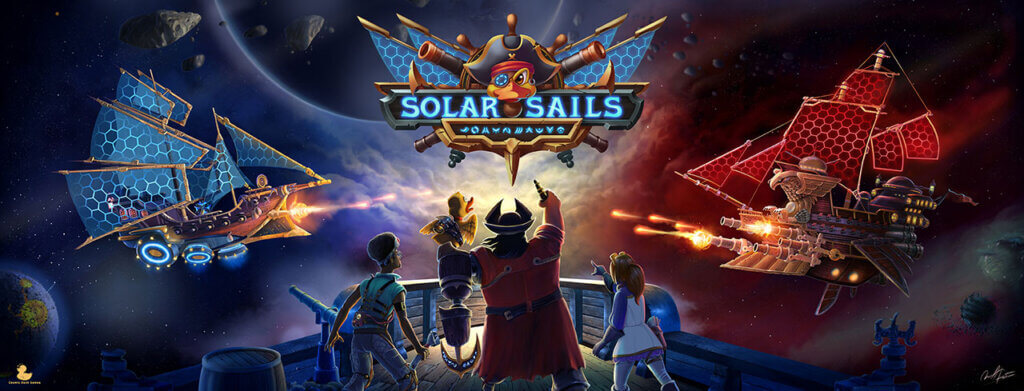
– “If you always wanted to be a pirate, plundering ships, collecting rum, and saving the universe, this game is probably just for you! Oh, you also get to do all of this in space.”
GamesIL reached out to us, offering to spread the word about Solar Sails: Space Pirates. GamesIL is an Israeli website dedicated to promoting Israeli Indie games. They’ve already covered a few successful Israeli games. The original article is in Hebrew. With the permission of the author we’ve translated the article so that you could read it here:
Solar Sails: Space Pirates
You might have heard of the game Solar Sails by Cosmic Duck Games that are in advanced development stages, but even if you haven’t you are welcome to keep reading this interview we did with the creators of the game on their work process, the Israeli gaming industry and a few words on the more casual casino games.
So how did it all start?
It all started back during a Global Game Jam. The jam theme was Waves, and we thought of an idea for a game where two players share the controls of a pirate ship. The waves element was realized when one player had to shoot sonar waves to uncover hidden enemies. Only when the enemies are exposed, the other player could operate the cannon, aim, and shoot them. A game that requires cooperation between the players.
Though the idea for the game was awesome, we didn’t manage to complete building the game within the game jam, due to its complexity. But we didn’t give up hope!
After the global game jam, we decided we want to treat this game as a serious project, so we started working on it in our free time. Slowly but surely our team grew more & more, and the game evolved and became better & better. We showcased the game at a few gaming conventions & events, and we received a lot of feedback on what works and what doesn’t in the game. We eventually decided to broaden the scope of the game, turning it from a simple action cooperation game to a story rich action-adventure game, where our pirate crew must explore space, discover fascinating monsters, plunder enemy ships, gain riches, upgrade the pirate ship, traverse dangerous areas and fight awesome bosses.
How does the development team look today?
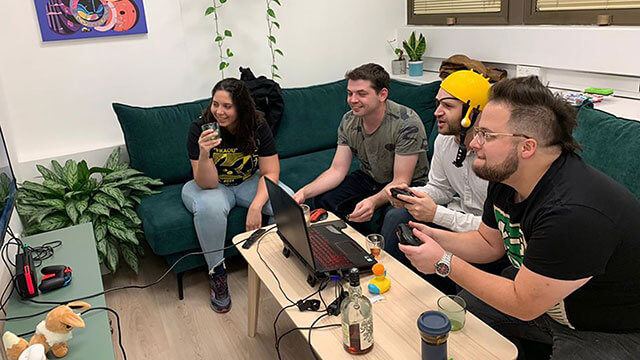
When we started, we had only three members on the team. As we went forward, more & more people wanted to join us. Some did join us, some didn’t and some left, but overall the team grew to keep up with the demand. As of today, we have 12 members on our team, all from the gaming industry or equivalent art industries. Most of the crew are from Israel, but we also have a few members from abroad – UK, Italy & USA.
We all work from our homes, in our spare time outside of our day jobs, but we do it in a consistent & ordered manner. Everyone has a defined job on the team, whether it’s a programmer, developer, modeler, concept artist, musician, writer, marketing, voice actor… We all work according to an organized pipeline.
Tell us a bit about your game
Solar Sails: Space Pirates is a top-down space action game that puts an accent on tactics, be it in Single Player or Local Co-op modes. The further progress and upgrade the ship, the smarter enemies you will encounter. Many times, the game requires the player to develop and practice different tactics against different types of enemies and bosses, and there is more than just one tactic that works. Solar Sails: Space Pirates challenge the player in many different ways and encourage experimentation.
The game itself combines the elements of tactical shooters and RPG’s – the controls and the overall pacing and experience remind those of Lovers in a Dangerous Spacetime, Overcooked, as well as Darksiders Genesis. As for the storyline, it remains one of the main driving forces of the game. It combines the elements of idealism and morbid humor and applies to those who are looking for crazy fantasy worlds which defy the tenets of logic.
So what is the storyline?
The story focuses on Captain Solomon Moreguns, a greedy old pirate searching for a huge ancient spaceship with mysterious technologies of an extinct alien race, intending to sell it on the black market. However, upon finding it, he realizes the race isn’t really extinct, and he has just awakened it from eons of slumber. They take control of the spaceship and start disintegrating star after star, planet after planet, and there is nothing to stop it.
There is a legend that whoever finds the 10 Quasar Elements – mysterious artifacts with primordial powers – will be able to control the Pandora Box. Only Barvaz, a time-traveling duck from the future, knows how to find the Quasar Elements and prevent the end of the galaxy. Barvaz has been serving as a mast duck for many captains in alternative timelines, as those captains attempted to stop inevitable. With each failure, Barvaz had witnessed the end of all things just before being sent to the past. Eventually, he memorized the locations of the Quasar Elements, and is henceforth determined to prevent the tragedy.
The problem is that Moreguns has long been planning to cook the duck. Will the hungry old pirate resist his gluttony or doom the entire galaxy?
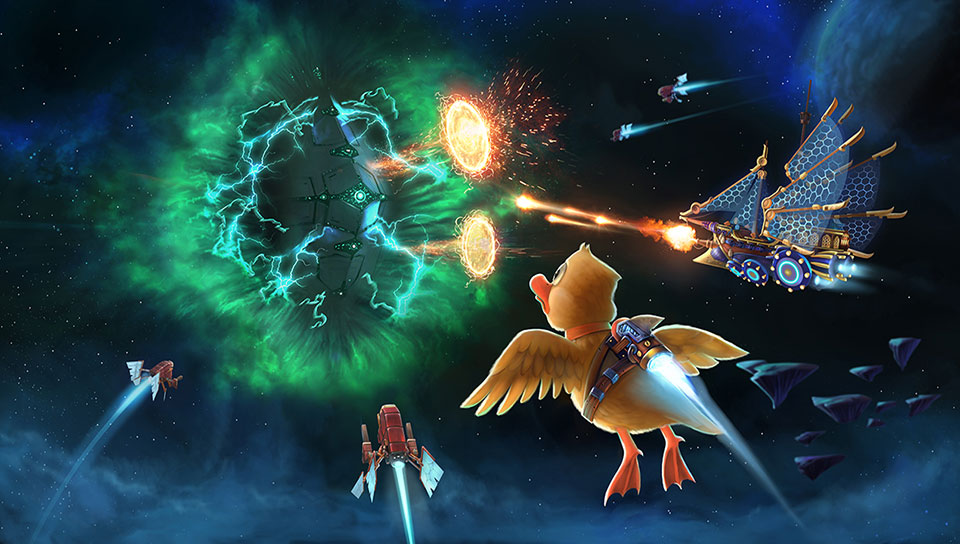
How is the game development process going on?
Well, like any other game, it begins with an idea, or a story, or an emotional experience. Then come the artistic style, the scope, the plan, the pipeline, the development, and the testing. Marketing is a process that should happen simultaneously to all of these. Moreover, after defining the idea, there is another important aspect that has to be considered – the theme. What is the game about? What is it really about? What is the emotion we want the players to experience? Who are the people who would enjoy our game (target audience)? What is the dynamic that will have the player experience that particular emotion? What are the mechanics that would create such a dynamic?
Once defined, the theme should serve as the compass for the entire team, up until the game is released and even beyond. If the game has a theme, it should always deliver it. If it doesn’t, then it’s probably going in the wrong direction. By the way, the marketing should also deliver this particular theme. If the theme isn’t played out well, so wouldn’t the core emotion, which is essential to attracting the audience. The theme and the core emotion are the backbones of the game.
What part of the game development process was most interesting for you?
I have a few examples of stages that answer that question, one of them is developing a boss fight. No doubt working on a boss fight is interesting, takes a lot of design, characterization, art, development, and of course a lot of testing. A boss fight should provide adrenaline to the player. If it doesn’t, the boss becomes redundant and boring.
How do you know a boss fight is working? If the player moves with their entire body when he tries to dodge or attack- you’re in a good direction. It means he’s not just “playing” the game, but “experiencing” it as well.
Another stage in developing a game that’s both interesting, annoying, difficult, and exciting is to create cutscenes. We’re used to seeing the cinematics of big game companies and we take them for granted, but can you imagine what it takes to create these? It’s a ton of work that isn’t always fun but, in the end, when you see it, it is, without a doubt, very satisfying.
But there is another stage in game development that dwarfs the two previous ones, and I would say it’s the most difficult one – developing a tutorial for the player. We are way beyond the times where players had the patience to read instructions before they start playing. The game itself must be intuitive enough to serve as some kind of a learning curve. The best experience is when the players don’t feel like the game is holding his hand, but instead let them try things on their own. This is the best way to make the player feel like he’s achieving goals. Basically, any game should focus on setting goals and letting players achieve them. The tutorial is no different.
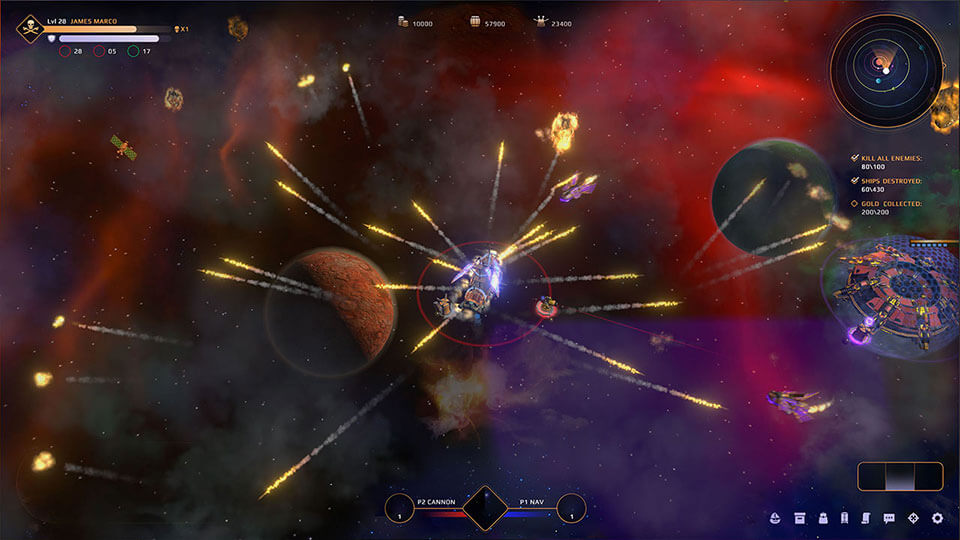
What stage of the game development is the most difficult?
The fund-raising stage is probably the most difficult one. It’s not just my opinion, it is something every independent game developer can relate to. Building a game, alpha version, beta, marketing – all of these stages mostly depend on how the developers believe in their project. Fundraising, on the other hand, is all about the ability of these developers to project that belief on other people. Those people usually get to see tens of other developers on a daily basis. Making a good presentation or pitch is a serious challenge for people that don’t come from the marketing world.
What mistakes have you made along the way?
“Let’s create the game first and then market it”- a classic mistake! It is not a mistake due to a lack of knowledge. Deep inside, they understand they need to market their game all the way during the production, not just afterward.
The thing is that it’s just uncomfortable. People who want to develop games, usually prefer working on the production side (and obviously do it better), rather than marketing. The reason is pretty clear – when we decide to develop a game, we already have a vision and know what we want. We have milestones, goals, which makes it (somewhat) clear.
But what do you do to market a game? What is the first step? The second step? The third? What do you do? What do you need to do? Where do you begin? That’s difficult indeed.
What are the difficulties in making a game?
Mainly, it is a high risk. Game making involves many risks that are related to factors that are out of our control. There are many competitors. You have to pay extra attention to the importance of scheduling, marketing, and quality.
Did you have the support of any gaming industry investors?
We did not. There are several private investors and probably funds in the future, but we are making our game with or without them. As far as we are concerned, an investment is something that both sides can profit from, but it is not the condition of whether the game will be published or not.
What kind of reactions do you get from people who saw the game?
Usually, “I want more,” tells us that there is a high expectation for the game. Sometimes it would be criticism, constructive criticism mostly, and we are doing all we can to listen to our growing community. For example, expanding the game from action co-op also to include an expansive universe and characters.
It is not common to develop a PC game in Israel. What sort of reactions do you get when you tell people that you develop games?
Q: “So, you are a computer guy?”
A: “No, I am a potato guy.”
Q: Are you a programmer?
A: I mean… There are other roles in the gaming industry other than programming.
Q: “So, you develop apps?”A: While a game is a type of app, much like coffee is a beverage, you don’t say, “Get me a cup of beverage,” do you?
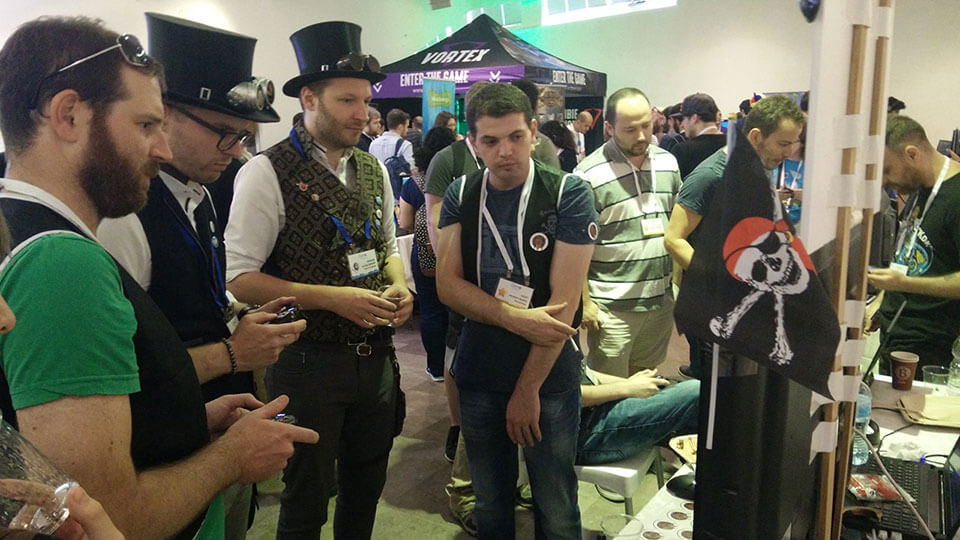
What are your tips for those who want to set foot in the industry?
My tip number one is don’t start with the idea you love. You’ve got a great idea for a game? Awesome! Put it on a shelf. Take an existing game or an existing idea and add your own twist to it. Do bring something of your own, but don’t fall in love with it. This alternative game idea will become your training grounds, your Trial and Error zone. As soon as you gain enough experience by developing 2-3 of these games, it is time for you to use your experience and go back to the idea you’ve put on the shelf. Otherwise, you might end up demotivated by the gap between the idea you feel entitled to versus what you will actually make due to lack of experience. It is important that you don’t fall in love with your first games.
Tip number two is to start as early as possible. Graduate from some studies and do your best to find your first job within the first year after graduation. Hurry up, because time is your enemy! And don’t be too picky about the companies to work at. Those companies that make the most interesting games are not necessarily the companies you will be happy to work at.
Tip number three – mobiles games are games too. Companies that make mobile games are often the most stable ones with higher salaries. Do not underestimate financial stability and work-life balance, because generally, this industry is very unstable. You never know when your last day in the office is.
Source:
Link to the original article in Hebrew:
http://gamesil.net/solar-sails/
Author: Yosi Dagan
